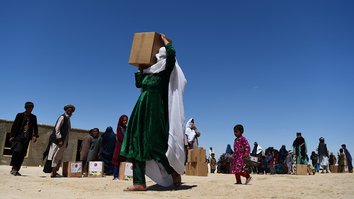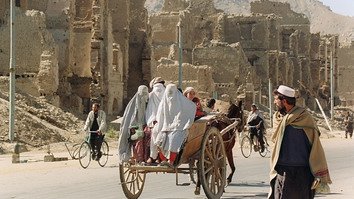KABUL -- The ongoing insecurity and risks created by the Taliban have crippled Afghanistan's economy, forcing investors to leave the country and causing the unemployment rate to skyrocket, say economists and other observers.
Billions of dollars in international aid provided one of the biggest opportunities for the growth of economy, trade and investment in Afghanistan, but the Taliban's ceaseless war jeopardised this historic opportunity, causing the Afghan economy not to grow as expected, said Khan Jan Alokozay, member of the Afghanistan Chamber of Commerce and Investment.
"The Taliban's years-long war has left a negative impact on the economy, trade and investment," Alokozay said. "Economic growth and investment need a secure and stable environment, but insecurity and challenges caused by the Taliban and other anti-government groups have slowed down economic growth as well as domestic and international investments."
"Our neighbours at one point didn't have any ... meaningful growth, but they are now self-reliant," he said. "Insecurity and wars have prevented our country from growing economically."
"The international community provided us with abundant funding and resources, but because of the Taliban and their war, Afghanistan couldn't use these resources to develop or grow."
If the Taliban were not waging war, Afghanistan could be an exporter, said Alokozay, adding that Afghanistan instead imports about $15 billion in goods [1.1 trillion AFN] a year from neighbouring countries.
Unemployment hike
"The Taliban and insecurity have endangered the physical and psychological safety of investors, and this issue has caused investors to refrain from investments, resulting in an increase in unemployment and poverty in the country," Alokozay said.
"The war has been a big threat to the economy, investment and employment," he said.
"Because of the insecurity, factories and [other] economic infrastructure has been ruined. Thousands of trucks are stopped every year on highways, leaving the goods and food shipped by our traders to perish along the way, and our country and investors incur losses of millions of dollars," he added.
The war that the Taliban have imposed on Afghans affects the economy and investment in two ways, said Zia Danesh, a university lecturer and economic analyst in Kabul.
"The direct consequences of the Taliban's war are that most of the national budget and foreign aid are spent on the war," said Danish. "If there were no war or insecurity, these funds and grants would be spent on the development and growth of the economy, investment, infrastructure, education and other key areas."
"Insecurity has indirectly discouraged domestic investors, foreign countries and international companies from investing in Afghanistan," he added.
Persistent war and a lack of investment in the country have led to a higher unemployment rate that in turn prolongs the war and displaces Afghans, said Danesh.
"The war the Taliban couldn't end in nearly two decades has caused millions of young people to lose their jobs and opt for illegal migration," said Khalilurahman Sarwari, a political affairs analyst in Kabul.
"Annually, we spend $6 billion [457.7 billion AFN] on the war because of the Taliban," said Sarwari. "If there were no war, this money could help improve the economy and prosperity as well as reduce unemployment."
Meanwhile, the Taliban's regular destruction of public infrastructure -- usually a tactic to prevent Afghan forces from pursuing them -- has brought big challenges to the country's economy, and the unemployment rate has soared among Afghans, said Sarwari.
"Unfortunately, the Taliban have mostly ruined the development and growth achieved with the help of the Afghan government and its international partners," he said. "This has crippled the economy, creating poverty and stagnation."
Political and economic stability
"Despite the security challenges facing economic growth ... Afghanistan achieved 2.7% growth in solar year 1397 [March 2017-March 2018], thanks to the government's effective plans," said Younus Salek, a spokesperson for the Ministry of Economy.
If there were no war, the Afghan government could spend most of its defence budget to lower the unemployment rate, said Zarif Aminyar, a senior adviser to the office of the president's special representative on economic growth, trade and poverty reduction.
"The Taliban's war has had a huge negative impact on ... all the economic sectors," said Aminyar.
"This war has negatively affected the structure and spending of the national budget," he said. "For instance, when you review the national budget, you can see that a huge amount of funding is allocated war. If there were no war, the government could spend that money on economic growth to rebuild the country."
"Because of war, other countries abstain from implementing major economic projects in Afghanistan," he added.
The government has "implemented major projects such as the National Solidarity Programme, Citizens' Charter, building dams, opening ports, establishing ground and air corridors, generating electricity, building roads, operating mines and rehabilitating historic sites that have helped achieve economic growth and reduce poverty and unemployment," he said.
"The government's vision is to achieve political stability through economic stability," added Aminyar. "The government has brought reforms in laws to help the private sector grow, and it has provided a suitable environment for the private sector to operate."
Although the Taliban continue fighting and create economic challenges and unrest in Afghanistan, the Afghan government's years of efforts have helped address these problems," said Jarullah Mansoori, former minister of the Ministry of Rural Rehabilitation and Development.
"Despite all the security issues, fortunately the government has had [some] achievements," said Mansoori. "The government designed effective economic policies that helped Afghanistan showcase its importance and economic potential to the world."
"Previously, we were dependent on one transit corridor, but the government's economic plans helped open numerous corridors," he said.
"Afghanistan earned membership in the World Trade Organisation [in 2016], and it was able to resolve some of its trade issues with the help of this organisation. It has also signed a number of road and railway agreements, which is of vital importance for the Afghan economy," he added.

![In this photograph taken last June 10, an Afghan child works in a plastic recycyling plant on the outskirts of Mazar-e-Sharif. [Farshad Usyan/AFP]](/cnmi_st/images/2020/05/05/23861-000_1hf0of-585_329.jpg)







During the last few decades war in Afghanistan cause a negative impact on people of this country. These wars make all the people optimistic and most of people hate there country and just want to leave country, they accept all risks of travel and travel to another country, all people think this country won't develope. Even though, they don't believe to government, cheats in government especially, elections cheats cause, cause this. Just there is one way to make this country; We MUST change the view of people about their country. As a teenager, I wish to see a peaceful life in my country.
Reply6 Comment
As much as I know, no.
Reply6 Comment
من باید کار کنم.
Reply6 Comment
Four decades of war in the country, and especially Taliban's war against the government in the last two decades has really destroyed all economic infrastructures and displaced hundreds of thousands of people inside the country, and disrupted the normal process of people's life. In addition to war, I would like to point out other factors that have crippled economic growth in Afghanistan. 1. One of the factors which has paralyzed Afghanistan's economic growth and caused poverty in this country is lack of investment on the natural resources, mines, infrastructures as well as lack of their proper exploitation. Afghanistan is considered a rich country in terms of mineral resources, but most of these pristine resources have remained intact and unknown. These sources are: natural gas, coal, iron, oil, copper, uranium, salt, chromium, nickel, gold, silver, sulfur, azure, ruby, aluminum, uranium graphite, etc. but, Afghanistan still has not invested properly on these mines. 2. Lack of governments’ plan or comprehensive strategy to decrease poverty can be considered another major factor for lack of economic growth in Afghanistan. The previous governments neither had any important plans nor did they take any basic steps to eradicate poverty. These problems also affected the current government of Afghanistan. Lack of careful planning for the prosperity of the economy of the villages, which makes up 70% of the country's population, can be considered a major cause of poverty. 3. Unemploymen
Reply6 Comment
Undoubtedly, Taliban’s war over the past two decades has caused to hamper Afghanistan's economic growth. If Taliban did not fight, I am sure that Afghanistan's economy would have been better today than that of the Central Asian countries. Billions of dollars were poured into the country, but unfortunately 70 percent of that money was spent on fighting against Taliban and other terrorist groups. It's still not late; Taliban must come to their sense and stop fighting. I am confident that if Taliban make peace with the Afghan government and establish a joint government, all the economic problems of Afghanistan will be resolved in the next ten years. Therefore, we urge Taliban not to cripple the economy of the people and the country anymore, and they have to come and work to alleviate poverty in this country.
Reply6 Comment
Either if they are the government, Taliban or other groups, all of them should work jointly in national issues such as economic growth, and no side should work in a way that hinders economic prosperity of the country. For example, if the Taliban takes over power tomorrow and the country is in a poor and bad condition, they will have a hard time to govern and if Afghanistan has made an economic growth then it will be easier for them to govern. Similarly, other groups should also work jointly for the reconstruction and economic growth of the country.
Reply6 Comment